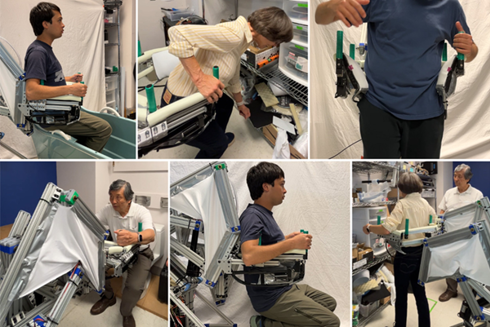The robot that helps people sit, stand – and catches them if they fall
22/05/2025

Caption: Photo: MIT
Engineers at the Massachusetts Institute of Technology (MIT) have developed a groundbreaking robot that could transform elder care. Meet E-BAR – short for Elderly Bodily Assistance Robot – a mobile robotic system designed to help older adults stay mobile, maintain independence, and reduce the risk of falls.
A robotic helping hand
E-BAR works like a set of robotic handlebars that gently follows the user from behind. Seniors can walk independently or lean on the robot for balance and support. If they need help standing up or sitting down, E-BAR can lift their full weight along a natural, ergonomic path.
Even more impressively, if a user begins to fall, E-BAR springs into action. Side airbags rapidly inflate to cushion and prevent injury – offering peace of mind to both users and their families.
Why this matters
Falls are the leading cause of injury hospitalisations in Australia and the top cause of injury-related deaths. In 2020-21 alone, fall injuries were estimated to cost the healthcare system $4.7 billion.
For many older adults, fear of falling can limit their activity, reducing mobility and independence – but the bulky and sometimes stigmatising nature of traditional aids often means they go unused.
“Many older adults underestimate the risk of falling and refuse to use physical aids, which are cumbersome,” said Harry Asada, Ford Professor of Engineering at MIT.
“Our design concept is to provide robotic handlebars that stabilise the body – they go anywhere and provide support anytime it’s needed.”
What’s next for E-BAR?
Currently, E-BAR is operated via remote control, but the research team has plans to make it smarter. Future versions will include autonomous features, enabling the robot to automatically follow and assist users throughout their daily routines.
The team is also working to slim down the design so it can move more easily through tight indoor spaces, like bedrooms and bathrooms.
“I think eldercare is the next great challenge,” says Roberto Bolli, the E-BAR’s lead designer and a graduate student in MIT’s Department of Mechanical Engineering.
“We’re facing a growing shortage of caregivers and an ageing population who want to stay in their homes. We see this as a new frontier – both in eldercare and in robotics.”














